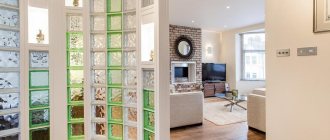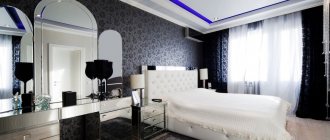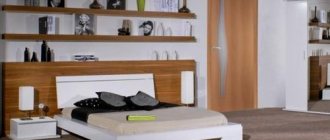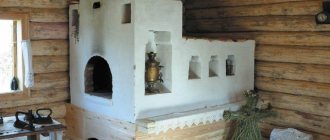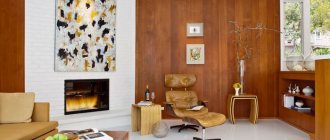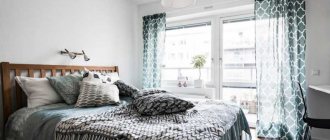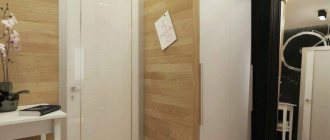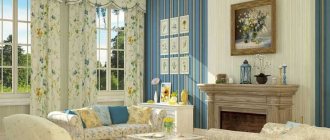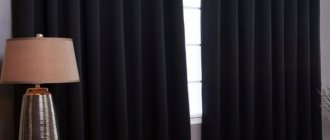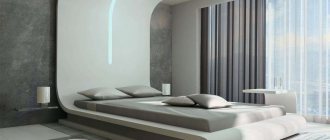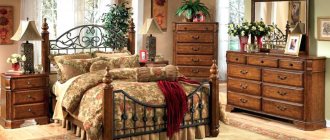Where are glass blocks used?
Glass blocks are distinguished by good sound-proofing and heat-saving properties, increased resistance to moisture and other external factors.
Application of material:
- For finishing walls or creating decorative inserts.
Decorative insert made of glass blocks Source homester.com.ua
- To create partitions and divide a room into functional zones.
- For finishing external walls of residential premises.
Glass blocks in a modern interior Source evrookna-mos.ru
- For zoning bathrooms, finishing shower walls.
The variety of surfaces, shapes and colors of glass blocks allows this material to be used for finishing rooms in various stylistic directions.
Most often, glass blocks are used to decorate the bathroom. The material is practical, resistant to high humidity, easy to care for, more reliable and durable compared to plasterboard.
Glass blocks in the bathroom Source pinterest.com
Walls made of glass blocks are suitable for decorating a shower stall.
In combined bathrooms, you can use material to divide a spacious room into functional zones. A straight or rounded wall made of multi-colored or single-color glass blocks can be used to decorate a shower stall or drain. You can also make a small partition between the toilet and the bathroom.
In a large room, you can separate the washing machine from the main area, creating a small room for washing and storing linen.
In the bathroom of a country house, you can cover the window with glass blocks with colored designs or stained glass; when exposed to sunlight, the window looks interesting and unusual.
Partitions and walls made of glass blocks are highly durable, but cannot replace load-bearing walls.
See also: Catalog of companies that specialize in interior redevelopment.
What is a decorative glass block: features of the material
A glass block is a hollow volumetric block created from fused glass plates about 10 mm thick. The product can have a square, triangular, round or rectangular shape. The first option is the most popular. Glass blocks are characterized by dimensions of 190x190 and 240x240 mm, thickness 80-100 mm. The weight of the product depends on the dimensions and averages 3-4 kg.
Glass blocks are moisture resistant, have high sound insulation and heat-saving properties
Glass blocks - the photos clearly show the different options - can be transparent or matte, with a smooth or textured surface, glossy, matte or with a mirror shine, which affects the light-scattering effect. Manufacturers produce products in a variety of colors, ranging from calm neutral shades to bright flashy colors.
Thanks to their special design, glass blocks are characterized by a number of distinctive advantages. Due to the air inner layer, the sound permeability of the material is reduced by 60-70%. The product is at the same time characterized by good light transmittance, and thanks to the dense glass, the outlines of the silhouettes located behind the glass block wall are blurred, this makes it impossible to spy on what is hidden from prying eyes.
Glass blocks are great for zoning a large room
The material is characterized by high strength, resistance to cracking, smooth surface and environmental friendliness, as a result of which it can be used for the construction of partitions in children's institutions. The products have increased moisture resistance, good thermal insulation, resistance to condensation and temperature fluctuations, which makes it advisable to use glass blocks for partitions in bathrooms, saunas and swimming pools.
Glass blocks do not require special care. The surface can withstand an unlimited number of cleanings using any detergent.
The glass block bar counter looks very original and stylish
However, this material is not without drawbacks. Among the main negative aspects is the significant weight of the product, for which reason it is not recommended to build walls made of glass blocks with an area of more than 15 m². In addition, installation of elements is very labor-intensive and requires certain skills and knowledge. Another disadvantage is the high cost of the products. You can buy a glass block from a domestic manufacturer for an average of 150-200 rubles. A product of European quality will cost 300-450 rubles. The cost of a decorative element varies between 1200-1500 rubles. a piece.
In the living room
Glass blocks in the living room interior can be used to create full-fledged partitions.
Glass blocks in the bedroom interior Source remontbp.com
The use of glass elements in wall decor looks very interesting, stylish and unusual.
Decorating walls with glass blocks Source HappyModern.RU
The material is used to construct the base of a small coffee table or a full-fledged dining table.
Glass blocks in the living room Source remontbp.com
By decorating the walls with glass blocks, you can highlight the necessary area in the room.
Glass walls
Transparent glass blocks are used for the construction of partitions and wall cladding. Products must be of high quality: plastic analogues, despite their cheaper cost, are inferior in quality to glass elements.
Decorative properties play an important role. Transparent rectangles or those with lighting or tinting look good. They decorate studio apartments and are used to decorate kitchens or bathrooms.
Interior walls, zoning partitions - these transparent elements are suitable for dark halls and other spaces where sunlight enters, refracting in the edges of the cube, maintaining the distinction between rooms.
In the bedroom
Glass blocks in the bedroom interior create a calming and relaxing atmosphere due to their ability to diffuse and refract light.
A glass block partition will help create a cozy atmosphere in the sleeping area.
Glass blocks can be used to decorate a doorway or part of a wall.
Decorating a bedroom with glass blocks Source remoo.ru
A wall made of blocks located opposite the window will create a festive atmosphere in the room, especially if you choose colored glass blocks, such as green ones, for decoration.
Green glass blocks in the bedroom Source happymodern.ru
In the hall
In most cases, hallways have a small area; to visually enlarge the space, you can use light shades in the interior or decorate the corridor with glass blocks.
The door to the living room can be replaced with a beautiful arch made of glass blocks.
The floor and ceiling can also be finished with a strong material, such as blue. You can make a small table from glass blocks near the wall.
Floor and ceiling made of glass blocks Source lboz.ru
Adding glass blocks to your wall trim can help improve illumination in a poorly lit hallway.
Wall decoration with glass blocks Source roomester.ru
In the kitchen
Glass blocks are used more often in creating kitchen interiors. Glass material is used not only for finishing walls, window and door openings, but also for finishing a kitchen apron, decorating and zoning a room.
Wall decoration with glass blocks Source roomester.ru
Recently, glass blocks have been used to make table bases. This decor looks quite interesting and unusual.
Clear glass blocks pair well with white kitchen cabinetry or wood trim.
Wall decoration with glass blocks Source homester.com.ua
Stylistic compatibility
Transparent blocks will fit into literally any interior style.
They look best in styles:
- urban, hi-tech;
- neo-baroque, neo-classical spaces;
- modern, loft;
- art deco, art nouveau;
- stylizations in oriental style.
Classical, baroque and rococo interiors, in which a historical bias is noticeable, are not suitable for the use of transparent cubes. Glass will also look out of place in “home” interiors in Provence, country, or rustic styles.
What types of glass blocks are there?
With increasing demand for the material, manufacturers began to introduce new shapes, colors and textures of glass blocks. Square and rectangular shapes are more popular compared to round and triangular ones. Strong and durable material can also be in the form of diamond, wave, hexagon.
Colored glass blocks in the interior Source topdom.ru
Depending on the scope of use, they distinguish: construction and decorative glass blocks.
Glass blocks made in Germany and Italy are considered the most expensive and high quality. They are distinguished by their strict shapes and sizes, a wide palette of shades, and a well-polished surface.
Manufacturers from the Czech Republic make bright glass blocks by painting them from the inside. This method makes it possible to reduce the cost of production while maintaining the quality properties of the product.
The budget option includes materials produced in Russia and Poland. Manufacturers are expanding their range with a variety of shades and textures of blocks.
The lower price segment is occupied by glass blocks from Belarus and China.
Depending on the material from which glass blocks are made, there are:
- plastic - glass blocks inside special structures;
- glass blocks made of cellular glass.
Manufacturers make 2 main types of glass blocks: transparent and colored. When producing colored glass blocks, dyes are added to the mass before molding.
Depending on the surface, there are 4 types of glass blocks:
- Sanded, smooth, throughput is 85%.
- Matte, transmits 50% of light.
- Glossy, obtained by polishing.
- Embossed, can diffuse or direct light.
- Glass blocks with a pattern or pattern have a high cost due to the complexity of production.
- Glass blocks with inserts are usually created for a specific design project.
Interior design with glass blocks Source roomester.ru
Depending on the lighting qualities, the material is divided into: light-directing, light-diffusing and translucent glass blocks.
It is necessary to choose glass blocks for the interior design of a living space based on the chosen stylistic direction and color design.
Glass blocks for partitions
A glass block is a block of thick glass plates fused into a single structure. A sealed air cavity is formed inside such a block, which increases sound and heat insulation parameters.
In other words, a glass block is a kind of glass brick of various shapes, from which you can lay various building and interior elements.
Advantages
Due to its structure, glass block has the following advantages:
- Natural materials in the composition ensure environmental friendliness.
- Unique properties: high mechanical strength (including compression and impact) and wear resistance, resistance to low and high temperatures, as well as temperature changes.
- Increased heat and sound insulation properties, not inferior to hollow bricks.
- Fire safety ensured by the non-flammability of the material.
- Ease of installation and further maintenance. The blocks can be cleaned with any detergent.
- Absolute moisture-proofness and water resistance, which makes it possible to use it as outdoor elements and in rooms with high humidity, even in water.
- Decorative. The glass block surface does not require additional finishing coatings. Modern blocks have different colors and shapes, which makes it possible to create the desired, attractive design.
An important distinctive feature of glass blocks is the ability to transmit diffused sunlight and provide unique lighting for the room . At the same time, the opacity of the elements protects from prying eyes.
Flaws
Like any building material, glass blocks also have certain disadvantages that must be taken into account during construction:
- The large weight significantly burdens the entire building structure. Taking into account this property, it is undesirable to erect walls and partitions with an area of more than 16 m².
- Increased cost of decorative glass blocks, which can reach 1500-1700 rubles/piece. At the same time, you can use ordinary economy class blocks with a cost of 100-130 rubles/piece.
- Problems that arise when attaching shelves and attaching various objects, because... It is difficult to secure a screw or nail in glass blocks. They can be solved using other standard fasteners and suction cups.
In general, glass blocks continue to be unfairly considered an exotic material. This attitude is developed due to a mistrust of the strength of glass. However, a glass block is quite difficult to destroy even with hammer blows, and their use is perhaps limited only by their increased cost.
What types of glass blocks are there?
Modern glass blocks do not have a legal classification, but the following main criteria for distribution by type can be distinguished:
- Block size. The most common are square-shaped glass blocks measuring 19x19 and 24x24 cm with a thickness of 8-10 cm, as well as rectangular elements measuring 19x9x8 and 24x11.5x8 cm. The weight of the bricks depends on the size and is in the range of 3-4.5 kg.
- Form. In addition to the most common square and rectangular options, glass blocks are available in triangular, round, and also in the form of a hexagon and the letter “G”. Elements can have clear, straight or rounded corners.
- Color palette and interior filling. The color of glass blocks can be different - from unpainted glass to bright shades (red, blue, black, etc.). There is usually an air cavity inside, but some models use decorative elements that are melted inside the block and create a specific pattern.
- Surface structure. Elements can have a smooth, glossy, corrugated, patterned surface. In addition, products with a matte surface are produced. The light transmission of the material depends on the structure.
- Glass element thickness . This indicator is responsible for the strength, specific gravity and some other characteristics of the material. Most often, blocks are made of glass with a thickness of 5.5-7 mm.
- Mechanical strength. Standard elements have fairly high strength, but additionally high-strength glass blocks are offered that can withstand even a bullet from a gun.
- Optical parameters . Products with this characteristic have a wide range - from almost transparent to opaque options. Glass blocks can provide directional or diffuse light output.
We recommend: Types of fender boards
Finally, glass blocks are distributed according to their intended purpose . The following main categories are distinguished: decorative, interior and building blocks. They differ in appearance, size, color, strength and other parameters.
We recommend reading: Properties, types and production technology of building glass
Features of interior glass blocks
The material is resistant to moisture, high or low temperatures, and easily transmits light, allowing you to save energy. It is not difficult to maintain glass blocks in their original form: they are easily cleaned of dirt with a damp cloth. Glass blocks in the bathroom interior allow you to increase the space of the room due to the ability of the material to transmit light.
Interior design with glass blocks Source remontbp.com
But there are negative sides to using them. You cannot attach a shelf or any decoration to a glass block wall or partition. They cannot be cut, it is impossible to lay electrical wiring between them.
Wall decoration with glass blocks Source peregorodkainfo.ru
Glass block partitions cannot serve as a load-bearing wall.
Glass blocks in the interior Source roomester.ru
If you cover a window with glass blocks, the ability to ventilate the room will disappear. Double-glazed windows made from glass blocks will help cope with this problem.
Glass block finishing Source dekormyhome.ru
Advantages and disadvantages
From such parts you can build a variety of structures. The installation principle is not too different from ordinary brickwork - all the parts are held together by a special cement mortar, however, they have certain advantages over standard brick:
- A wall assembled from such bricks will transmit light. For transparent blocks, the light transmission rate is 80 percent, while for matte blocks it is about 50. Corrugated and colored parts can transmit from 30 to 50 percent of light.
- Glass is a non-flammable material that can withstand open fire for up to one hour.
- Hollow products can improve the sound insulation of a room and increase its thermal insulation.
- All products of this type are moisture resistant, withstand exposure to chemical reagents and last a very long time without changing their characteristics.
- The blocks can be used to create interior partitions, walls, or use them to build facades.
- Caring for the created surface is very simple - all you need is a glass care product.
In addition to the advantages, glass cubes for walls also have several disadvantages. They are quite significant and must be taken into account before starting repairs:
- Quite a high cost. The material definitely cannot be called cheap and it is not suitable for budget repairs. This is especially true for varieties of glass blocks with additional decor in the form of various inserts.
- The construction time of even a small partition will be very significant, since a limited number of rows can be laid at a time.
- To create a wall or partition, you must have at least minimal knowledge in the field of building brick walls.
Care is very important when working with such material. Incorrectly removed solution particles. Glass that gets on the surface during installation can dry out and then be difficult to remove. In addition, you will need to purchase additional material in the form of reinforcing rods to create a durable structure.
Installation of glass block partitions
Creating structures from glass blocks is a simple process. Installation of glass block partitions includes the following steps:
- Determining the installation location of the partition.
- Preparing and cleaning the mounting surface. Using slats, you need to outline the boundaries of the base of the structure.
- Laying the first row of glass blocks.
- Installation of stainless steel reinforcing rod. It is not recommended to lay more than 3 rows of blocks per day, as the structure may warp.
- After the mixture has completely dried, you need to remove the crosses and protective film on the blocks and begin applying the grout mixture.
- After cleaning the partition and drying it completely, it is necessary to protect the structure from moisture by applying a waterproofing liquid.
Glass blocks in a modern interior Source www.gradnja.rs
Laying blocks
There are 3 ways to install glass blocks:
- Without a solution, instead they turn to frames or modules made of wood.
- Using a mortar of cement and sand.
- Using glue.
The first method is suitable even for beginners who are not familiar with laying any types of bricks. The module includes cells where you need to install blocks, securing them with rubber gaskets.
This method allows you to make a flat wall in a short period of time, without resorting to a level. Another advantage of this installation method: ease of dismantling. If necessary, the partition can be disassembled without damaging the glass blocks. This cannot be achieved if installed with adhesive or mortar.
Adhesive for installing cubes is sold complete with blocks. This type of installation is also very fast. The glue has a transparent structure, so it does not spoil the appearance of the finished wall.
It is much more difficult to make glass masonry using mortar. This method is the cheapest and most common for many craftsmen.
There are a number of recommendations for using cement-sand mixture:
- You need to choose very fine sand, as large pebbles can scratch the glass;
- You can lay out a maximum of three rows per day: the setting of the solution and glass occurs slowly;
- The mortar is not suitable for the construction of high walls, since the lower layers may crack under the weight of the upper ones;
- To create a durable structure, before laying each subsequent row, it is necessary to insert metal rods with a cross-section of 5-6 millimeters into the seams;
- The seams need to be treated with colored grout, as stripes of gray cement will spoil the appearance. To save time, you can immediately buy cement with pigment.
